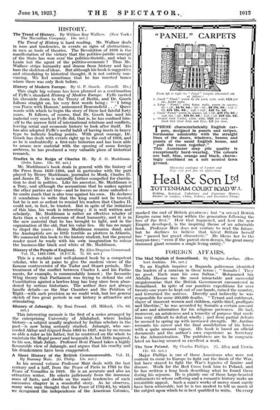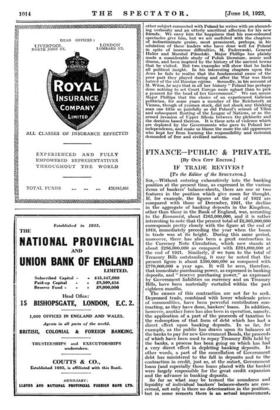Major Phillips is one of those Americans who were not
content to come to Europe to fight out the finish of the War, but have stayed to fight the War's legacies of famine and disease. Work for the Red Cross took him to Poland, and he has written a long book describing what he found there during his sojourn. He is plainly one of those large-hearted enthusiasts to whom suffering and a romantic history make an irresistible appeal. Such a man's works of mercy must surely have been admirable, but he is too modest to tell us much of the subject upon which he is best qualified to write. On every
other subject connected with Poland he writes with an abound- ing verbosity and an utterly uncritical affection for his new friends. We envy him the happiness that his rose-coloured spectacles give him, but we are surfeited with the chapters of indiscriminate praise, most prominent, perhaps, in his adulation of those leaders who have done well for Poland in spite of immense difficulties, M. Paderewski, General Haller and Marshal Pilsudski. Major Phillips has plainly made a considerable study of Polish literature, music and drama, and been inspired by the history of the ancient towns that he visited. But two examples will show that he lacks all political insight. In his interesting chapters upon the Jews he fails to realize that the fundamental cause of the poor part they played during and after the War was their hatred of the old Russian regime. Secondly, in his account of M. Witos, he says that in all her history " Poland has perhaps done nothing to set Court Europe more aghast than to pick a peasant for the head of her Government." We can assure Major Phillips that the choice of an experienced Galician politician, for some years a member of the Reichsrath at Vienna, though of yeoman stock, did not shock any thinking man one tithe so painfully as did Poland's seizure of Vilna and subsequent flouting of the League of Nations, or as the armed invasion of Upper Silesia between the plebiscite and the decision based thereon. It is these acts of violence which are deplored by the Governments who gave to Poland her independence, and make us blame the more the old oppressors who kept her from learning the responsibility and restraint demanded of free and civilized nations.







































 Previous page
Previous page